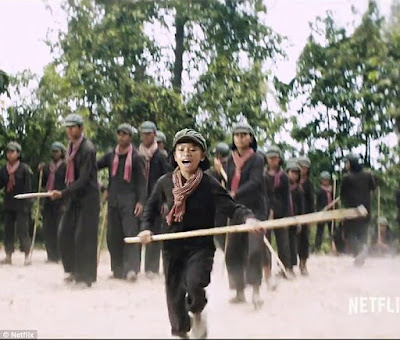by Allan Tong
2017 will be remembered as the downsized TIFF: fewer films, slower sales and smaller red carpets (literally). The Canadian economy is growing, but Hollywood is in a slump, coming off its worst summer box office in over a decade. Inevitably this effects TIFF which the Hollywood studios use (Sept.7-17 this year) as the unofficial launch of the Oscar race. Before the festival, TIFF had already announced the end of the Vanguard and City to City programs and, sadly, the cessation of multimedia exhibitions in its gallery space, such as the dazzling ones to Kubrick and Cronenberg. Of course, the biggest news was TIFF CEO Piers Handling announcing his retirement after the 2018 edition.
 |
| The Italian party hosted by Mongrel Media |
Where is TIFF headed? Where is the movie industry headed? One answer: the internet.
The studios used to premiere star-studded films at TIFF before releasing them in the following weeks and months to qualify for the Oscars and determine their marketing plans. This year, streaming giant Netflix has unveiled two acclaimed features, First They Killed My Father and Mudbound at TIFF.
In fact, First They Killed My Father appeared on Netflix and American cinemas) on the day of its second TIFF screening, Sept. 15. Despite home access, a sold-out crowd packed the Princess of Wales Theatre on King Street West to behold Angelina Jolie's searing adaptation of Loung Ung's childhood memoirs of surviving the Cambodian genocide of the late-70s.
In First They Killed My Father, Loung (a convincing Sareum Srey Moch) is only five-years-old when the Khmer Rouge, Communist fanatics, seize control of Cambodia in 1975 and unleash four years of terror and genocide. They killed two million men, women and children, or a quarter of the population. With uncompromising detail, First They Killed My Father is seen through Loung's eyes, shot in Steadicam, as her bourgeoise family flees the capital, loses everything and struggles in a slave labour camp where they starve and toil barefoot to grow food for Khmer soldiers battling the Vietnamese. One of Loung's sister's dies of disease. Her father is executed. Her mother orders Loung and her two siblings to escape into the jungle and assume false identities. Loung never sees her again.
Loung becomes a child soldier, trained to shoot a rifle and to plant landmines in the jungle. Later, she watches in horror as landmines blow apart refugees fleeing falling bombs. Starvation, beatings of adults and children alike, brainwashing to shun your own family and obey the Khmer, and murder. There's no end to the misery that Loung sees, but she and her siblings press on to offer the film a ray of hope during this nightmare. First They Killed My Father is strong medicine, but mesmerizing.
The film is effectively told from various viewpoints and voice-overs Rashomon-style, including Laura (Carey Mulligan) who plays the sympathetic wife of the white farmer, and Florence (hip hop star Mary J. Blige) as her black counterpart. The cast is all-around strong, and the script (by director Dee Rees and Virgil Williams) weaves a powerful tale about race told from a fresh setting, though it sags in act two and suffered from a muddy sound mix at its TIFF screenings.
The Price of Success: A good Cain-and-Abel story from France about a famous comedian (Tahir Rahim of A Prophet) who cuts loose his hot-headed brother (Roschdy Zem) as business partner to go his own way. The film unnecessarily strays at the start to establish the brotherly conflict but when the story finally clicks the tensions rise, fists fly and the their north African family gets sucked into the mess.
Professor Marston and The Wonder Women: Marston created comic book heroine Woman Woman to promote the superiority of women. He also had a taste for bondage which trickled its way into Wonder Woman's exploits until moralists lierally burned the comic. The movie intercuts between Marston's interrogation by these moralists and Marston's (played by Luke Evans) three-way relationship with his wife Elizabeth (Rebecca Hall)--both academics at Tufts University.in the 1920s--and student Olive (Bella Heathcote). Clearly aiming for a mainstream American audience, the film is surprisingly funny and the love scenes chaste. The ending trails off, but by then you're either enchanted by this trio's unconventional love story or unconvinced. Judging by the reaction at TIFF, most of the audience was seduced.
Schmoozing
For Canadian filmmakers "you going to the BBQ?" is a common question, referring to the annual fundraiser on the verdant grounds of the Canadian Film Centre in North York on the first Sunday. Like a proud grandfather, school founder Norman Jewison rallied the crowd to cheer the Canadian films playing at TIFF, taste the food from food sponsors offering paella, corn on the cob and burgers, check out the sponsors who were offering film services (from post production to lights) in tents lining the lawn, and support the CFC by buying raffle tickets that volunteers were selling.
In fact, First They Killed My Father appeared on Netflix and American cinemas) on the day of its second TIFF screening, Sept. 15. Despite home access, a sold-out crowd packed the Princess of Wales Theatre on King Street West to behold Angelina Jolie's searing adaptation of Loung Ung's childhood memoirs of surviving the Cambodian genocide of the late-70s.
In First They Killed My Father, Loung (a convincing Sareum Srey Moch) is only five-years-old when the Khmer Rouge, Communist fanatics, seize control of Cambodia in 1975 and unleash four years of terror and genocide. They killed two million men, women and children, or a quarter of the population. With uncompromising detail, First They Killed My Father is seen through Loung's eyes, shot in Steadicam, as her bourgeoise family flees the capital, loses everything and struggles in a slave labour camp where they starve and toil barefoot to grow food for Khmer soldiers battling the Vietnamese. One of Loung's sister's dies of disease. Her father is executed. Her mother orders Loung and her two siblings to escape into the jungle and assume false identities. Loung never sees her again.
Loung becomes a child soldier, trained to shoot a rifle and to plant landmines in the jungle. Later, she watches in horror as landmines blow apart refugees fleeing falling bombs. Starvation, beatings of adults and children alike, brainwashing to shun your own family and obey the Khmer, and murder. There's no end to the misery that Loung sees, but she and her siblings press on to offer the film a ray of hope during this nightmare. First They Killed My Father is strong medicine, but mesmerizing.
Jolie tells a powerful story. Her first smart decision was to go to Netflix to make it, because any Hollywood studio would have insisted on imposing a White Saviour character to tell the story and to save the non-white characters. I'm sure some will criticize Jolie, who is white, of cultural misappropriation, but consider that she actively collaborate with Loung--who co-wrote the screenplay and was an on-set consultant--and co-producer Rithy Panh, an internationally renown filmmaker himself. Also, the entire cast is Cambodian; everything was filmed in Cambodia; and her adopted son Maddox Chivan is one of the producers. Jolie has presented this harrowing chapter in Cambodian history honestly. (For a fascinating look behind the making of this film, click here.)
Netflix produced First They Killed My Father, but acquired Mudbound after its Sundance premiere. Netflix will release the film online and in theatres on Nov.17. Mudbound tells the story of two families in rural Mississippi during World War Two. A poor black family basically serves the poor white family that moves onto the land they work on for pennies. Slavery is officially over, but it endures in 1941. The story hinges on a son in each family who return from war--the white man suffering trauma that his bigoted father (an odious Jonathan Banks) dismisses as unmanly, and the black man who fought to free Europeans only to return home to be repressed.
The film is effectively told from various viewpoints and voice-overs Rashomon-style, including Laura (Carey Mulligan) who plays the sympathetic wife of the white farmer, and Florence (hip hop star Mary J. Blige) as her black counterpart. The cast is all-around strong, and the script (by director Dee Rees and Virgil Williams) weaves a powerful tale about race told from a fresh setting, though it sags in act two and suffered from a muddy sound mix at its TIFF screenings.
The Price of Success: A good Cain-and-Abel story from France about a famous comedian (Tahir Rahim of A Prophet) who cuts loose his hot-headed brother (Roschdy Zem) as business partner to go his own way. The film unnecessarily strays at the start to establish the brotherly conflict but when the story finally clicks the tensions rise, fists fly and the their north African family gets sucked into the mess.
Schmoozing
 |
| The SODEC reception, the major funder of Quebec cinema--consistent award winners at TIFF. |
For Canadian filmmakers "you going to the BBQ?" is a common question, referring to the annual fundraiser on the verdant grounds of the Canadian Film Centre in North York on the first Sunday. Like a proud grandfather, school founder Norman Jewison rallied the crowd to cheer the Canadian films playing at TIFF, taste the food from food sponsors offering paella, corn on the cob and burgers, check out the sponsors who were offering film services (from post production to lights) in tents lining the lawn, and support the CFC by buying raffle tickets that volunteers were selling.
 |
 |











No comments:
Post a Comment